About four years ago 55 years old Marjina Khatun who lives in Ranigram under the Pabna Sadar upazila, she was employed as a domestic helper. However, she made a creative decision that has allowed her to use the money she makes from selling fish waste and scales to support her own family. She told that how her husband and disabled son operate a fish business in the local market. They earn more than Tk30,000 a month by gathering wet fish wastes and scales from the market, cleaning and drying them and then selling them to traders. They have constructed a home and purchased property with that money. In their own pond, they are currently raising fish. They have also acquired one bigha of land that is next to their courtyard. In the future, Marjina hopes to provide jobs for other women in her area.
Four years ago Marjina became interested in fish scale processing after being inspired by a Jashore businessman. She revealed that at first she dried the scales on jute sacks laid out on the ground which led to inferior quality and less expensive rates. A local NGO called “Programme for Community Development” gave her technology, training and support. She began using a specialized processing procedure. She was able to charge more for it because the product was of superior quality.
Exports of Fish Scales
Fish scales made up the majority of the $14.99 million in fish scale and trash exports in fiscal year 2019-2020 according to a survey conducted by the Export Promotion Bureau (EPB). Since then, the nation has been exporting fish scales valued at an average of Tk200 crore every year. Nonetheless, since 2020, the volume of exports has grown. The total value of exports in FY24 was $17 million, or Tk206 crore.
About ten years Md. Kamruzzaman from Jashore has been buying and exporting fish scales for. He exports at least 10 tonnes of fish scales every month after gathering them from every district in the country’s north and south. Businessman said that entrepreneurs used to have trouble processing fish scales correctly. However the majority of them are now able to process the scales effectively after undergoing various forms of training. Kamruzzaman purchases these processed scales and uses various intermediaries to ship them to China, Japan, and Korea.

Great Opportunities for Employment
Executive director of the Program for Community Development Md. Shafiqul Alam said fish waste is produced practically everywhere in the nation. He also said that proper handling of this trash contributes to less contamination in the environment. It can be turned into useful items using biotechnological and processing techniques. We are helping entrepreneurs in a number of ways to process fish scales for commercial use as part of the PKSF Rural Microenterprise Transformation Project. Many people in remote areas are finding work. Alam thanked for this efforts to the entrepreneurs.
After obtaining government and non-government training, Rumi Begum, a resident of Shantinagar in Joypurhat sadar, has been properly processing fish scales using new technology. Approximately 150 to 200 kg of fish scales are sold by her each month. In addition to taking care of her family, Rumi sells fish scales for Tk15,000 a month. Five additional people in the region have started processing fish scales after she set an example, she said.
What are the scales on fish?
Fisheries researchers said waste and scales make up 20–25% of a fish’s body weight on average. Fish scales create a protective layer over the fish’s body, which is typically thrown away, according to agricultural experts and fisheries researchers. This garbage was previously disposed of carelessly, polluting the environment. On the other hand, fish excrement and scales have substantial commercial value. They are high in calcium and protein. Fish scales typically include 30–40% hydroxyapatite and 60–65% protein, both of which are very good for human health.
Kazi Ahsan Habib a professor in Sher-e-Bangla Agricultural University’s Department of Fisheries Biology and Genetics said processed fish scales can be used to make a number of high-value goods, such as collagen, collagen peptides, hydroxyapatite, organic fertilizers, coatings for pharmaceutical capsules, and cosmetics. According to him collagen is a fibrous protein that is present in animal connective tissues, bones, and skin. “If fish scale processing is developed locally, it could create employment opportunities for many people and have a positive impact on the economy,” Professor Habib stated.
Various NGOs are working under the Rural Microenterprise Transformation Project in 49 upazilas in 23 districts, including Pabna, Sirajganj, Rajshahi, and Naogaon, with an emphasis on waste management, fish farming, and scalability in order to improve the foundation of the domestic rural economy. The goal of these programs is to create and sell high-quality goods. This industry employs more than 150,000 individuals, more than 50,000 of them are women. The Palli Karma-Sahayak Foundation (PKSF), DANIDA, and the International Fund for Agricultural Development are funding the initiative.
According to Md. Fazlul Kader, managing director of PKSF, the nation’s fish scale market is worth about Tk250 crore, and hundreds of business owners are active in it. He also told that Chinese people employ fish scales to make gelatin for the food and pharmaceutical industries. “Currently, we import these products at six times the cost.” But there is hope because there are plans to build medium-scale producers,” he added. The objective is to use them to make fish scale items locally in the future.This industry has attracted a lot of local businesses, and if it succeeds, it will boost the nation’s economy even more.
Source: The Business Standard
















